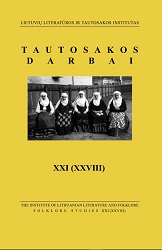SAKMIŲ TRADICIJA IR INDIVIDUALUS PASAKOTOJO REPERTUARAS
THE FOLK BELIEF LEGEND TRADITION AND THE INDIVIDUAL REPERTOIRE OF THE STORYTELLER
Author(s): Lina BūgienėSubject(s): Cultural history, Customs / Folklore, Oral history
Published by: Lietuvių literatūros ir tautosakos institutas
Keywords: Folk belief legend tradition; Storyteller; folklore research; oral tradition; Linda Dégh; Carl-Herman Tillhagen;
Summary/Abstract: The starting point for the present article consists of the seeming contradiction between views expressed by two prominent folklore researchers: an assertion by Linda Dégh (1992) that “legend tellers do not exist” in the same sense as performers of the other kinds of folklore, and Carl-Herman Tillhagen’s maintaining that it was the tradition bearer that folklorists should concentrate on (1961). The purpose of the investigation was finding out, what was there special about the folk legend tellers and their repertoire, i.e., what was their relation to the oral tradition of the community and their social status, how did they decide what to tell and by what means did they memorize their stories, whether they themselves believed in things they told, etc. In order to comprehend these issues, both studies of oral narrative and the narrators by the established Finnish folklore scholars, like Anna-Leena Siikala, Annikki Kaivola-Bregenh¸ j and others, as well as personal fieldwork experience of the author and observations made while collecting folklore in eastern and southern Lithuania were relied upon. Having met and interviewed quite a few interesting storytellers, it seemed plausible to conclude that the main features of the good legend tellers included their personal quest for the legends, their active interest in the supernatural, as well as their special capacity to memorize and willingness to reproduce the stories they had heard. In most cases, the use of the narrative, linguistic and performance devices proved to be of the secondary importance, as indeed it was “the message that shaped the story”, to use an expression by Linda Dégh, and the active personal involvement of both the teller and the listener in the narrative event.
Journal: Tautosakos darbai
- Issue Year: 2005
- Issue No: 29
- Page Range: 58-66
- Page Count: 9
- Language: Lithuanian

